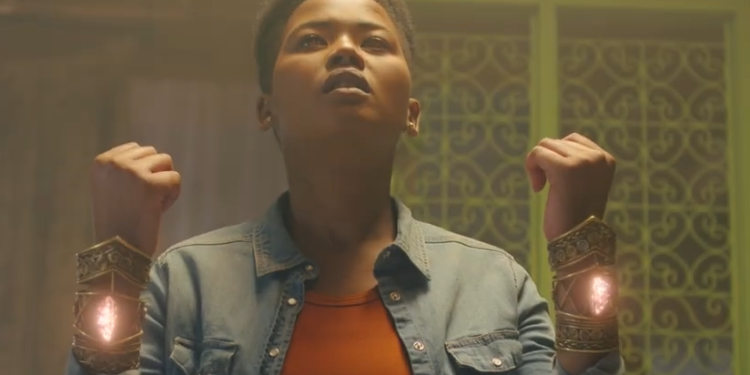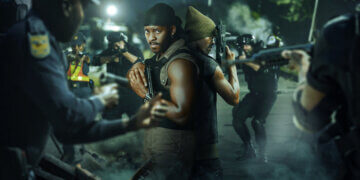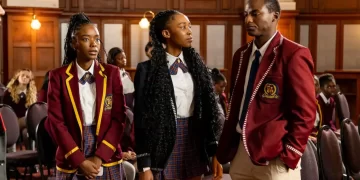The Brave Ones is certainly a brave approach to the idea of a television show, and African lore mixed with fantasy genre elements, and to the progression of African filmmaking taking further leaps into ambition. So one is left to wonder, where did it all go wrong? Let’s investigate.
This show follows the story of a problem child, Ntsiki Gasa (Sthandile Nkosi, The Queen) around whom the show is centred. She’s one of the ‘Brave Ones,’ an ancient group of immortals created to protect the Tree of Life, a girthy eucalyptus that supposedly connects the three worlds – the living, the dead, and that of those not yet born. They do this in conjunction with the ‘Wise Ones’, a group of… you know what? It’s all just too much. When J. R. R. Tolkien wrote the most clusterfucked fantasy novel of all time, we read it with no sense of confusion at all. The Lord of Rings is an intergalactic salad compared to this local beef stew if we’re discussing the sheer density of lore, yet the latter is the one that confounds us.
It is my thinking that, generally, one would want to watch fantasy to escape to a place even further than other genres allow. I could see how it may seem interesting, placing fantasy in a hyper realistic mode of filmmaking, but interesting is not the result achieved in The Brave Ones. What’s begotten by overlaying Ilanga ghettos and ancient Trees of Life is supreme incongruity, snowballing into confusion.
There’s Ayanda (Nomalanga Nkosi) and her husband, who’s the head of an NGO on the verge of building a major casino in Ilanga, only after evicting every pauper there and destroying their homes. Problem is, that village is also the spot in which The Tree of Life rests, unseen by all but a chosen few, and should the aforementioned casino be built, The Tree of Life would wither and die, and thus magic in this world would cease to exist. Again, it’s a lot to take in, not helped by the manner in which this information is delivered. Precariously ruined, you can tell they tried to be slick with it, attempting what’s clearly right on paper – weaving information into the episodes, slowly allowing the viewer to get sucked in.
But somehow, in the depths of their textbook (and I’m getting to this too, hold on), they only managed to make a confusing mess of what is quite obviously a simple and simply trite narrative. Ayanda’s whole drive, the whole meaning to her existence, according to this show, is to save her dying son. We see this boy a total of maybe two or three times, mentioned only once in a while when the show wants to remind us why this woman is running around helter-skelter doing as the plot beckons. Like reciting lines that could’ve been spoken in any odd scene in any odd thousand shows. Anyway, the kid is dying and she’s looking for the Brave One, yet undiscovered, who’s the only one that can save his life. With a start like that, and with the way The Brave Ones progresses afterward, you can bet on very good odds that this show could’ve been written by A.I.
I have attempted to watch it in both the dubbed and original version in Zulu, and as all things go, the original audio is far superior. Do not fear the subtitle. There’s a certain cringiness to the English version. The language doesn’t seem to match the performances acted in Zulu with their colourful vocal and physical flourishes. The performances themselves are perfectly fine, indeed, some even exceptionally good but all of which are reduced in value due to the disaster that is the show that produced them.
Ntsiki Gasa’s sister, Funeka (Keke Mphuti), is murdered as a consequence of her grassroots political activism. When she dies, we feel nothing. They want us to feel something, as evidenced by the slow music playing below the slow-motion shots of her funeral, yet we feel nothing. With the naive way she acted in life, from the little we saw, like chanting street rally slogans at an elegant party in which a smarter revolutionary would’ve played the diplomatic field, it’s almost as if she were begging for death. She leaves an even bigger fool behind, in the form of her boyfriend, intent on avenging her death in all the wrong ways, you tsk whenever he gets away from trouble.
The only scenes in which The Brave Ones has real texture, are the dreamy ones, sadly few, of the other worlds and whatnot. A lot of them are in the latter half of the season, two episodes of which (5 and 6) are directed by Kenya’s Tosh Gitonga. Perhaps the souvenir of a plot starts to ramp up here, and the show becomes slightly more tolerable.
As The Brave Ones‘ main director, South Africa-based Nigerian writer-actor-director Akin Omotoso (also behind critically-acclaimed 2022 biographical sports film Rise), a superbly talented triple threat, only lacked real balance with this one. There’s real ore under the surface here but the majority of the important decisions were made dubiously without care. Commissioned by Netflix already means a certain brand of thing, however, this show is far too textbook, far too tame, far too indulgent, meandering, predictable and far too boring.
The Brave Ones is available to stream on Netflix.
Enjoyed this article?
To receive the latest updates from Sinema Focus directly to your inbox, subscribe now.











